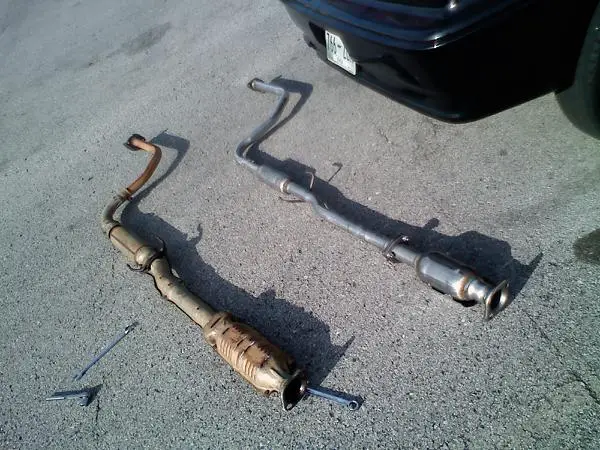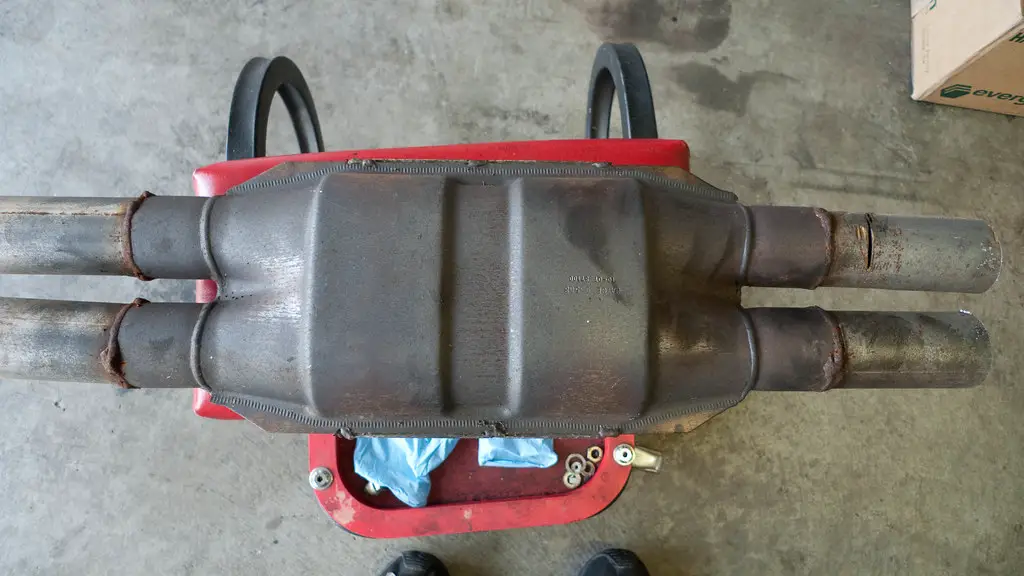- What Does Your Car Insurance Cover
- How Can You Protect Your Vehicle
- What Are the Most Common Causes
- How Much Does It Cost to Replace
- Is There a Way to Track It Down
- The Legal Implications of Stealing
- Tell If Your Catalytic Converter Is Stolen
- Benefits of Installing an Anti-Theft Device
- Should You Consider Comprehensive Coverage
- Do All Insurance Companies Offer Coverage
What Does Insurance Cover When It Comes to Catalytic Converter Theft?
Does auto insurance cover catalytic converter theft? When it comes to catalytic converter theft, insurance coverage can vary depending on the policy. Generally speaking, comprehensive auto insurance policies may cover the cost of replacing a stolen catalytic converter. However, some policies may require that you pay a deductible before coverage kicks in.
Additionally, some insurers may not cover the cost of replacing a stolen catalytic converter if it was due to negligence or lack of security measures taken by the vehicle owner. It is important to check with your insurer and review your policy documents to determine what type of coverage you have for this type of theft.
If you do not have comprehensive auto insurance or if your policy does not include coverage for catalytic converter theft, you may want to consider purchasing additional coverage from your insurer or shopping around for another provider who offers this type of protection.
How Can You Protect Your Vehicle from Catalytic Converter Theft?
Protecting your vehicle from catalytic converter theft is an important step in keeping your car safe. Catalytic converters are a valuable target for thieves due to the precious metals they contain, such as platinum, palladium, and rhodium. Here are some tips to help protect your vehicle from catalytic converter theft:
1. Park in well-lit areas: Parking in a well-lit area can deter potential thieves and make it easier for you or passersby to spot any suspicious activity. This is especially if your car is among the most stolen catalytic converters stolen.
2. Install security cameras: Installing security cameras around your parking area can help deter potential thieves and provide evidence if a crime does occur.
3. Install an alarm system: An alarm system can alert you or your neighbors of any suspicious activity near your vehicle, making it less likely that a thief will attempt to steal the catalytic converter from your car.
4. Use wheel locks or tire clamps: Wheel locks or tire clamps make it difficult for someone to move the car without the proper key, making it more difficult for them to access the catalytic converter underneath the car without being noticed by passersby or security cameras nearby.
5. Engrave identifying marks on the catalytic converter: Engraving identifying marks on the catalytic converter makes it easier for law enforcement officials to identify stolen parts if they are recovered after being stolen from your vehicle, increasing their chances of returning them back to you safely and quickly if they are ever taken away by criminals looking for scrap metal value of these parts.
What Are the Most Common Causes of Catalytic Converter Theft?
Catalytic converter theft is a growing problem in many parts of the world. The catalytic converter is an important part of a vehicle’s exhaust system, and it helps to reduce emissions. Unfortunately, thieves are targeting these components due to their valuable metals, such as platinum and palladium. The most common causes of catalytic converter theft include:
1) Easy Accessibility: Catalytic converters are typically located underneath the vehicle, making them easy targets for thieves who can quickly remove them without being noticed.
2) High-Value Metals: As mentioned above, catalytic converters contain valuable metals that can be sold for a high price on the black market. This makes them attractive targets for criminals looking to make quick money.
3) Lack of Security Measures: Many vehicles do not have any security measures and catalytic converter theft prevention measures in place to protect their catalytic converters from being stolen. This lack of security makes it easier for criminals to target these components without fear of getting caught or facing consequences.
4) Low Risk/High Reward Ratio: Catalytic converters are relatively small and lightweight components that can be easily removed from vehicles with minimal effort or tools required by the thief. This low risk/high reward ratio makes them attractive targets for criminals looking to make quick money with minimal effort or risk involved in the process.
How Much Does It Cost to Replace a Stolen Catalytic Converter?
Replacing a stolen catalytic converter can be an expensive endeavor. The cost of the replacement part itself can range from $100 to $2,000 depending on the make and model of your vehicle. In addition to the cost of the part, labor costs for installation can range from $150 to $1,000 depending on how difficult it is to access and replace the converter.
Other costs may include diagnostic fees or additional parts that may need replacing due to damage caused by theft or vandalism. All in all, replacing a stolen catalytic converter can cost anywhere from several hundred dollars up to several thousand dollars.
Is There a Way to Track Down a Stolen Catalytic Converter?
Unfortunately, tracking down a stolen catalytic converter can be difficult (which is why it can be handy to learn does auto insurance cover catalytic converter theft). However, there are some steps you can take to help increase the chances of recovering your stolen property.
- First, contact the police and file a report. Be sure to provide as much information as possible about the make and model of your vehicle, as well as any identifying features of the catalytic converter itself (such as color or markings). This will help law enforcement in their investigation (enforced by catalytic converter theft laws).
- Second, contact local scrap yards and auto parts stores in your area to see if anyone has attempted to sell a catalytic converter matching yours. You may also want to check online classifieds such as Craigslist or eBay for listings that match your description.
- Third, consider installing an anti-theft device on your vehicle that will make it more difficult for thieves to remove the catalytic converter without being detected. There are several types of devices available on the market today that can be installed relatively easily by most car owners with basic mechanical skills.
- Finally, spread the word about what happened through social media or other outlets so that people in your community are aware of what happened and can keep an eye out for suspicious activity related to stolen catalytic converters in their area.
What Are the Legal Implications of Stealing a Catalytic Converter?

“CRX b-pipe and catalytic converter” by CrowzRSA is licensed under CC BY-SA 4.0
Stealing a catalytic converter is a serious crime with legal implications. Depending on the jurisdiction, it may be considered either grand theft or petty theft. In most cases, it is classified as grand theft due to the value of the item being stolen.
Grand theft is usually punishable by jail time and/or fines. Additionally, if caught in possession of a stolen catalytic converter, one may face additional charges such as receiving stolen property or possession of burglary tools (if any were used).
In some jurisdictions, stealing a catalytic converter may also be considered an environmental crime due to its impact on air quality and emissions standards. This could result in additional fines and penalties for those convicted of this offense.
It is important to note that even if one does not get caught in the act of stealing a catalytic converter, they can still face legal consequences if they are found in possession of one that has been reported as stolen or was obtained through illegal means.
Therefore, it is important to always ensure that any parts purchased are from legitimate sources and have not been obtained illegally or through questionable means.
How Can You Tell If Your Vehicle Has Had Its Catalytic Converter Stolen?
If your vehicle has had its catalytic converter stolen, there are several signs that you can look for. Firstly, you may notice a loud rumbling or roaring noise coming from the exhaust system. This is because the catalytic converter helps to reduce engine noise and without it, the sound will be much louder than usual (note what does a missing catalytic converter sound like).
Secondly, you may also notice a decrease in engine performance as the catalytic converter helps to improve fuel efficiency and reduce emissions. Lastly, if you look underneath your vehicle near the exhaust system, you may see evidence of tampering such as saw marks or scratches on the metal piping where someone has cut off the catalytic converter.
If any of these signs are present then it is likely that your vehicle’s catalytic converter has been stolen. For more insight, check out our guide on the signs of a stolen catalytic converter.
What Are the Benefits of Installing an Anti-Theft Device on Your Vehicle’s Exhaust System?
Installing an anti-theft device, such as a catalytic converter shield or cover, on your vehicle’s exhaust system can provide a number of benefits. Firstly, it can act as a deterrent to potential thieves, as the device will make it more difficult for them to steal your vehicle.
Secondly, the device can help protect your exhaust system from damage caused by tampering or attempted theft. Finally, installing the best catalytic converter anti-theft device may also reduce your insurance premiums, as insurers may view this additional security measure favorably.
In summary, installing an anti-theft device on your vehicle’s exhaust system can help protect both you and your car from theft and damage. It is therefore worth considering if you are looking for ways to improve the security of your vehicle. For more insight, check out our explainer on DIY catalytic converter protection devices.
Should You Consider Adding Comprehensive Coverage to Your Auto Insurance Policy
Yes, you should consider adding comprehensive coverage (if you’re concerned about auto insurance cover catalytic converter theft) to your auto insurance policy for protection against catalytic converter thefts. Comprehensive coverage is an optional form of car insurance that covers damage to your vehicle caused by events other than a collision.
This includes theft, vandalism, fire, hail, and flooding. It also covers damage caused by animals and falling objects such as trees or branches. Catalytic converter theft has become increasingly common in recent years due to the rising price of precious metals used in their construction.
The cost of replacing a stolen catalytic converter can be expensive and may not be covered under standard auto insurance policies. Adding comprehensive coverage to your policy can provide financial protection against this type of theft and help cover the cost of repairs or replacement if necessary.
Comprehensive coverage is typically more expensive than basic liability insurance but it can provide peace of mind knowing that you are protected from unexpected losses due to theft or other non-collision related damages.
Before making any decisions about adding comprehensive coverage to your policy, it is important to speak with an experienced auto insurance agent who can explain the details and help you determine if this type of additional protection is right for you. Not to mention, does auto insurance cover catalytic converter theft.
Do All Insurance Companies Offer Coverage for Loss or Damage
No, not all insurance companies offer coverage for loss or damage due to catalytic converters being stolen from vehicles. It is important to check with your insurance provider to determine if they provide this type of coverage. Some insurers may offer optional coverage for the theft of catalytic converters, while others may include it as part of their comprehensive auto insurance policy.
If you are considering purchasing a policy that includes this type of coverage, it is important to understand the terms and conditions associated with the policy to ensure that you are adequately protected against losses due to theft or damage caused by catalytic converter theft.

